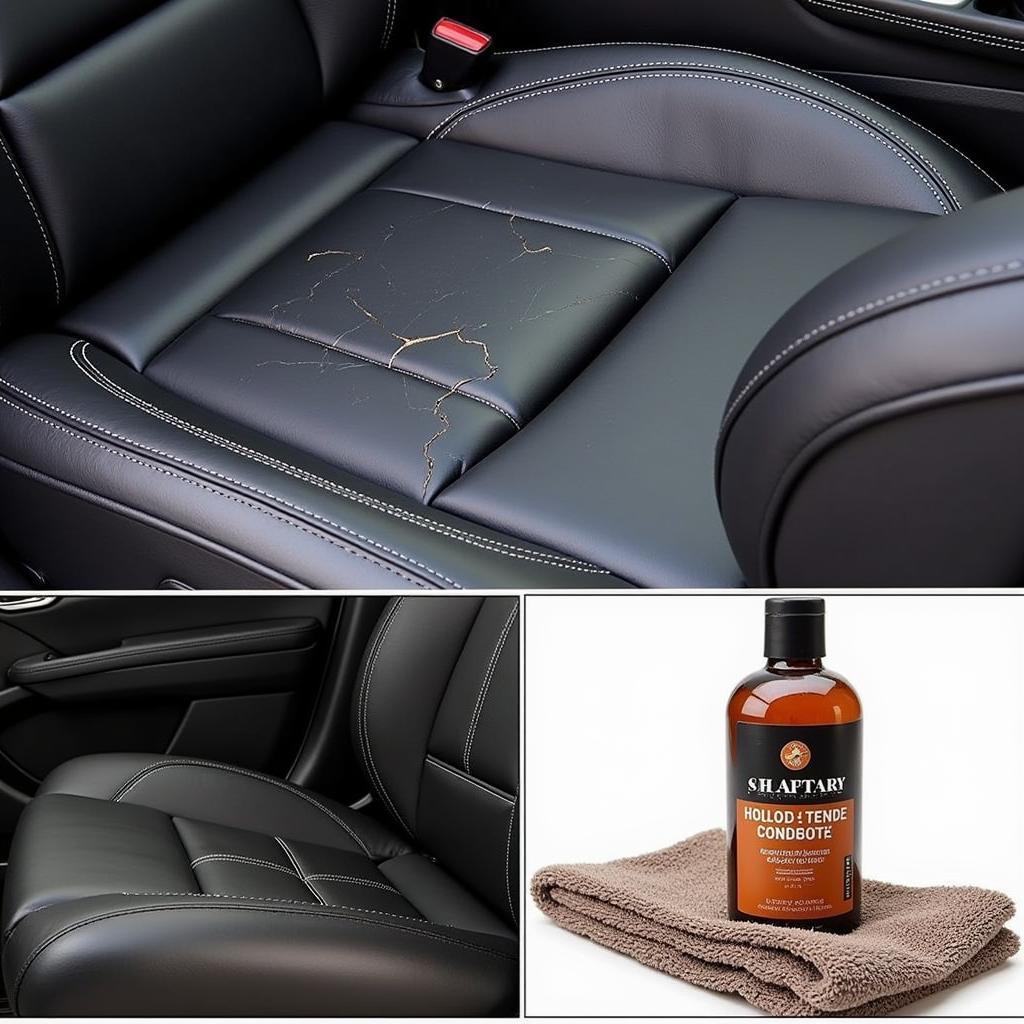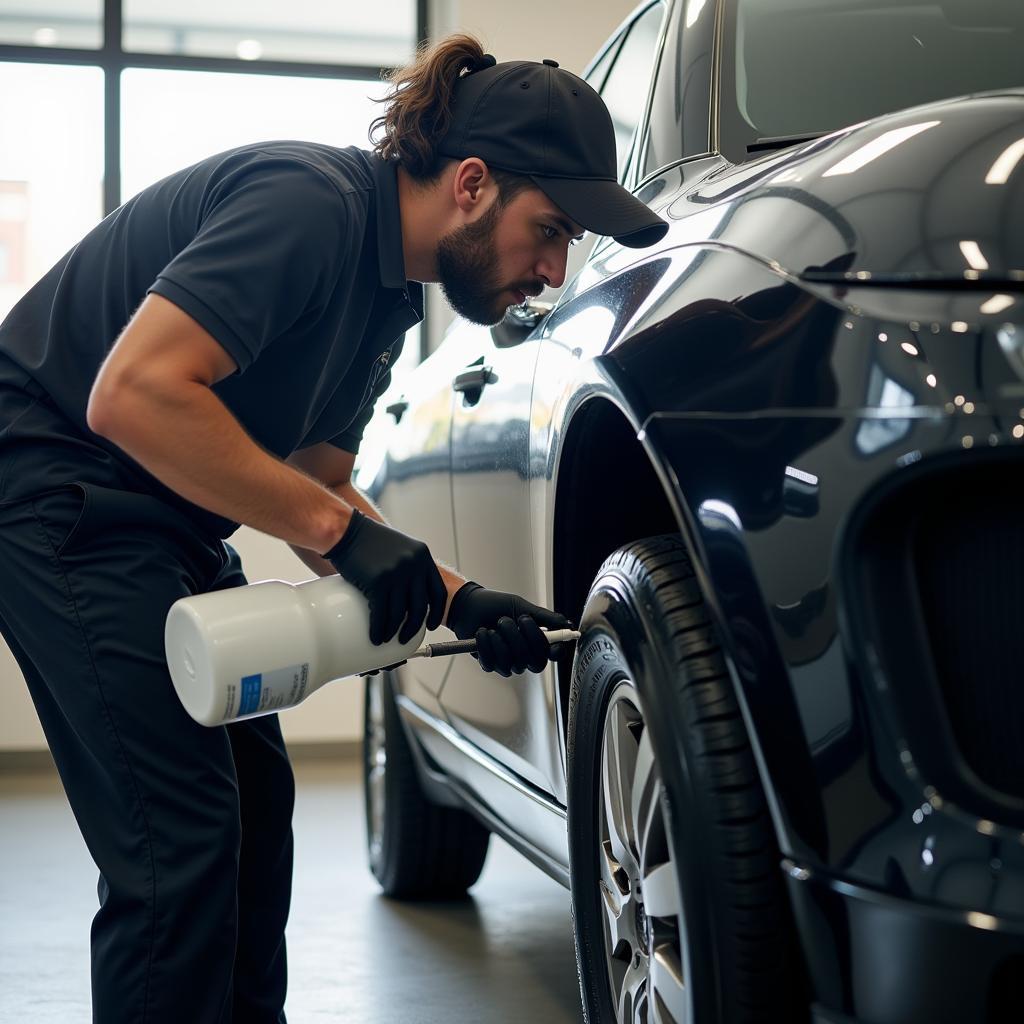Car detailing is known for enhancing a vehicle’s appearance, but a common concern among car owners is whether it can lead to unintended dryness. This article addresses the question, “Can A Car Detailing Service Dry Out My Car?” by exploring the detailing process, potential drying effects, and preventative measures. We’ll delve into the various aspects of car detailing and its impact on different car materials.
Understanding the Car Detailing Process
Car detailing involves a thorough cleaning and restoration of a vehicle, both inside and out. It goes beyond a regular car wash and focuses on meticulous cleaning, paint correction, and protection. While detailing enhances your car’s aesthetics and can increase its resale value, certain practices might contribute to dryness if not performed correctly.
How Detailing Can Cause Dryness
While car detailing aims to improve your car’s appearance, certain products or techniques, if misused, can lead to drying effects on various materials. For example, harsh chemicals used for cleaning or degreasing can strip away natural oils from leather, vinyl, and rubber surfaces. Similarly, excessive use of strong detergents during washing can strip the wax protection and contribute to paint fading over time. Incorrect application or overuse of dressing products can also leave a sticky residue that attracts dust and grime, making the surfaces appear dull and dry.
 Car Detailing and Drying Effects on Leather Seats
Car Detailing and Drying Effects on Leather Seats
Preventing Dryness During Car Detailing
Professional detailers understand the potential drying effects of certain products and employ techniques to mitigate these risks. They use pH-balanced cleaners, apply appropriate protectants, and adhere to best practices to minimize dryness. For instance, high-quality leather conditioners are used to replenish moisture and prevent cracking. Similarly, using premium waxes or sealants creates a protective layer on the paint, shielding it from UV rays and environmental contaminants.
Protecting Your Car’s Interior
Interior detailing often involves cleaning various materials like leather, vinyl, plastic, and fabric. Each material requires specific care to prevent dryness. Leather requires conditioning to maintain its suppleness. Vinyl and plastic benefit from UV protectants to prevent fading and cracking. Fabric upholstery requires gentle cleaning solutions to avoid discoloration and dryness.
Can improper washing dry out my car’s paint?
Yes, improper washing, such as using harsh detergents or washing in direct sunlight, can strip the protective wax layer and lead to paint drying and fading.
What are the signs of a dry car interior?
Signs include cracking or fading leather, stiff or brittle vinyl, and a dull appearance of plastic surfaces.
how to know if car was detailed properly
Choosing the Right Detailing Service
Selecting a reputable car detailing service is crucial to avoid potential damage. Look for detailers who use high-quality products, have experienced technicians, and offer tailored services based on your car’s specific needs. Inquire about the products they use and their process for protecting various materials.
How can I prevent my car from drying out during detailing?
Choose a reputable detailer who uses high-quality products and proper techniques, and communicate your concerns about dryness beforehand.
Are there specific products I should ask my detailer to use to prevent dryness?
Yes, inquire about pH-balanced cleaners, leather conditioners, and paint sealants with UV protection.
Expert Insights
John Carter, Master Detailer at Pristine Auto Detailing: “A key aspect of preventing dryness during detailing is understanding the materials involved and using the right products. A high-quality leather conditioner can be the difference between supple leather and cracked leather.”
Sarah Miller, Automotive Specialist at Gleam Detailing: “Prevention is always better than cure. Protecting your car’s surfaces with appropriate sealants and conditioners will minimize the risk of dryness and maintain their appearance for longer.”
what is done for interior car detail
 Professional Car Detailing Preventing Dryness
Professional Car Detailing Preventing Dryness
Conclusion
While car detailing can potentially dry out certain car materials if not performed correctly, choosing a reputable service that uses high-quality products and proper techniques can significantly mitigate these risks. By understanding the process and taking preventative measures, you can ensure your car receives the best care and maintains its pristine condition. Remember to ask questions and communicate your concerns to your detailer to achieve the desired results without compromising your car’s materials.
FAQs
- Can car detailing damage my car’s paint? Improper techniques or harsh chemicals can damage the paint. Choose a reputable detailer.
- How often should I detail my car? It depends on usage and environmental factors, but generally, every 3-6 months is recommended.
- What is the difference between car washing and car detailing? Detailing is more thorough and includes cleaning, restoration, and protection.
- Is car detailing worth the cost? It enhances appearance, protects the car, and can increase resale value.
- Can I detail my car myself? Yes, but it requires knowledge, time, and the right products.
- How do I choose a good car detailing service? Look for experience, positive reviews, and high-quality products.
- What should I ask my detailer before the service? Inquire about their process, products, and specific concerns like dryness prevention.
Need help with your car? Contact us via WhatsApp: +1(641)206-8880 or Email: [email protected]. We have a 24/7 customer support team ready to assist you.

Leave a Reply